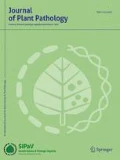During June and August in 2018, kiwifruit (cv. Hayward) plants exhibiting symptoms of charcoal rot including chlorosis, necrosis, leaf shedding, root rot, and trunk dry rot were observed with an incidence of up 5% in three commercial orchards located in Altınordu, Fatsa and Perşembe districts of Ordu province. After surface sterilization with 1% NaClO, small pieces excised from root tissues of diseased plants were rinsed twice in sterile distilled water, dried on sterile filter papers and aseptically transferred to plates containing potato dextrose agar. Ten isolates from the plates were identified as Macrophomina phaseolina (Tassi) Goid. based on the growth characteristics, agar pigmentation, and the presence of microsclerotia 78.8 to 90.75 μm in diameter (n = 30) (Dhingra and Sinclair 1973). To confirm the identification, the internal transcribed spacer (ITS) of rDNA of a representative isolate (KWF09) was amplified and sequenced. The resulting 537-bp sequence (GenBank accession No. MK287619) shared 99% similarity to those of M. phaseolina isolates CBS-231.33, CBS-457.70 and CBS-126630 (KF951631, KF951636 and MH864176, respectively) in the GenBank database. The pathogenicity assay with isolate KWF09 was performed on 4-month-old kiwifruit seedlings according to Singleton et al. (1993). The seedlings were transferred to the growth chamber and kept at 28 °C. Six weeks after inoculation, brown to black lesions were observed on the roots of inoculated plants, from which M. phaseolina was consistently re-isolated. Although detailed studies are needed to determine the distribution of charcoal rot in Ordu, to our knowledge, this is the first report of charcoal rot caused by M. phaseolina on kiwifruit from Turkey.
References
Dhingra OD, Sinclair JB (1973) Location of Macrophomina phaseolina on soybean plants related to culture characteristics and virulence. Phytopathology 63:934–936
Singleton LL, Mihail JD, Rush CM (1993) Methods for research on soilborne phytopathogenic fungi. APS Press, St. Paul
Author information
Authors and Affiliations
Corresponding author
Ethics declarations
Conflict of interest
The authors declare no conflict of interests.
Research involving human participants and/or animals
The authors declare that no human participants and animals were involved in this study.
Informed consent
This manuscript is new and not being considered elsewhere. All authors have approved the submission of this manuscript.
Additional information
Publisher’s note
Springer Nature remains neutral with regard to jurisdictional claims in published maps and institutional affiliations.
Rights and permissions
About this article
Cite this article
Türkkan, M., Benli, H.İ., Yılmaz, Ö. et al. First report of charcoal rot caused by Macrophomina phaseolina on kiwifruit in Turkey. J Plant Pathol 102, 535 (2020). https://doi.org/10.1007/s42161-019-00428-x
Received:
Accepted:
Published:
Issue Date:
DOI: https://doi.org/10.1007/s42161-019-00428-x

